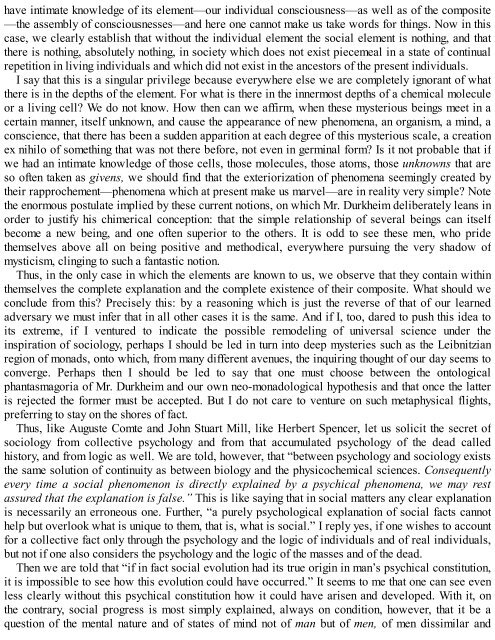3658925934
You also want an ePaper? Increase the reach of your titles
YUMPU automatically turns print PDFs into web optimized ePapers that Google loves.
have intimate knowledge of its element—our individual consciousness—as well as of the composite<br />
—the assembly of consciousnesses—and here one cannot make us take words for things. Now in this<br />
case, we clearly establish that without the individual element the social element is nothing, and that<br />
there is nothing, absolutely nothing, in society which does not exist piecemeal in a state of continual<br />
repetition in living individuals and which did not exist in the ancestors of the present individuals.<br />
I say that this is a singular privilege because everywhere else we are completely ignorant of what<br />
there is in the depths of the element. For what is there in the innermost depths of a chemical molecule<br />
or a living cell? We do not know. How then can we affirm, when these mysterious beings meet in a<br />
certain manner, itself unknown, and cause the appearance of new phenomena, an organism, a mind, a<br />
conscience, that there has been a sudden apparition at each degree of this mysterious scale, a creation<br />
ex nihilo of something that was not there before, not even in germinal form? Is it not probable that if<br />
we had an intimate knowledge of those cells, those molecules, those atoms, those unknowns that are<br />
so often taken as givens, we should find that the exteriorization of phenomena seemingly created by<br />
their rapprochement—phenomena which at present make us marvel—are in reality very simple? Note<br />
the enormous postulate implied by these current notions, on which Mr. Durkheim deliberately leans in<br />
order to justify his chimerical conception: that the simple relationship of several beings can itself<br />
become a new being, and one often superior to the others. It is odd to see these men, who pride<br />
themselves above all on being positive and methodical, everywhere pursuing the very shadow of<br />
mysticism, clinging to such a fantastic notion.<br />
Thus, in the only case in which the elements are known to us, we observe that they contain within<br />
themselves the complete explanation and the complete existence of their composite. What should we<br />
conclude from this? Precisely this: by a reasoning which is just the reverse of that of our learned<br />
adversary we must infer that in all other cases it is the same. And if I, too, dared to push this idea to<br />
its extreme, if I ventured to indicate the possible remodeling of universal science under the<br />
inspiration of sociology, perhaps I should be led in turn into deep mysteries such as the Leibnitzian<br />
region of monads, onto which, from many different avenues, the inquiring thought of our day seems to<br />
converge. Perhaps then I should be led to say that one must choose between the ontological<br />
phantasmagoria of Mr. Durkheim and our own neo-monadological hypothesis and that once the latter<br />
is rejected the former must be accepted. But I do not care to venture on such metaphysical flights,<br />
preferring to stay on the shores of fact.<br />
Thus, like Auguste Comte and John Stuart Mill, like Herbert Spencer, let us solicit the secret of<br />
sociology from collective psychology and from that accumulated psychology of the dead called<br />
history, and from logic as well. We are told, however, that “between psychology and sociology exists<br />
the same solution of continuity as between biology and the physicochemical sciences. Consequently<br />
every time a social phenomenon is directly explained by a psychical phenomena, we may rest<br />
assured that the explanation is false.” This is like saying that in social matters any clear explanation<br />
is necessarily an erroneous one. Further, “a purely psychological explanation of social facts cannot<br />
help but overlook what is unique to them, that is, what is social.” I reply yes, if one wishes to account<br />
for a collective fact only through the psychology and the logic of individuals and of real individuals,<br />
but not if one also considers the psychology and the logic of the masses and of the dead.<br />
Then we are told that “if in fact social evolution had its true origin in man’s psychical constitution,<br />
it is impossible to see how this evolution could have occurred.” It seems to me that one can see even<br />
less clearly without this psychical constitution how it could have arisen and developed. With it, on<br />
the contrary, social progress is most simply explained, always on condition, however, that it be a<br />
question of the mental nature and of states of mind not of man but of men, of men dissimilar and









![Genki - An Integrated Course in Elementary Japanese II [Second Edition] (2011), WITH PDF BOOKMARKS!](https://img.yumpu.com/58322134/1/180x260/genki-an-integrated-course-in-elementary-japanese-ii-second-edition-2011-with-pdf-bookmarks.jpg?quality=85)
![Genki - An Integrated Course in Elementary Japanese I [Second Edition] (2011), WITH PDF BOOKMARKS!](https://img.yumpu.com/58322120/1/182x260/genki-an-integrated-course-in-elementary-japanese-i-second-edition-2011-with-pdf-bookmarks.jpg?quality=85)





